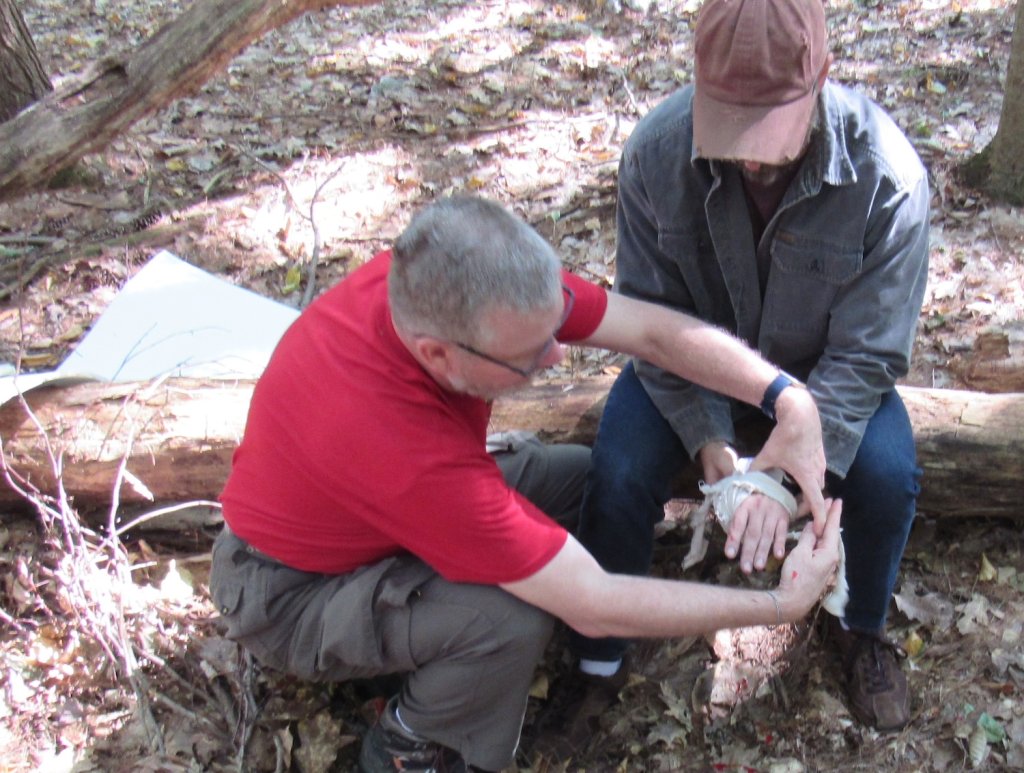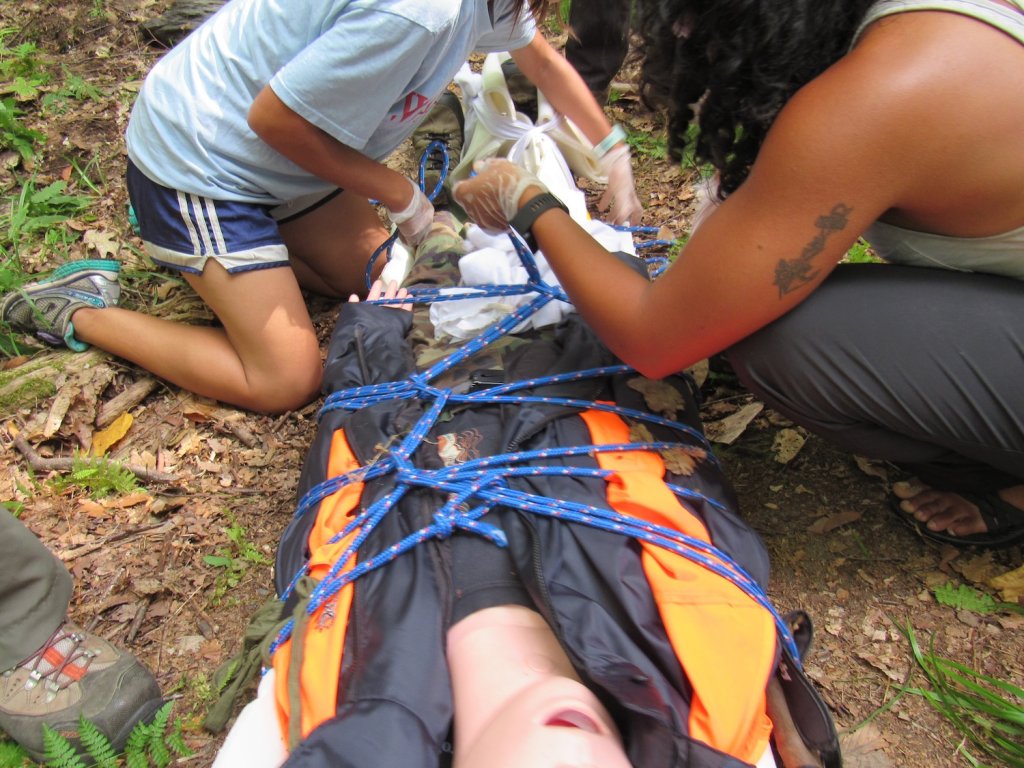· Min. Size: 4
· Max. Size: 12
· Dates: 10/27-11/9
· Maine SAA Approved: Yes
· Tuition: $2600
Professional Wilderness Medical Training Taught By Guides, For Guides.
2-Week course that combines a modern Wilderness First Responder (WFR) course with essential bushcraft and leadership skills for managing a remote medical/survival incident.
Course Calendar Register Now
Standards-Based Professional Training
The Maine Guide Medic course is a standards-based advanced Wilderness First Responder course designed to take people far beyond the minimum competencies offered elsewhere. It is designed to make people better able, as working guides and instructors, to manage a backcountry medical incident. Designed for those who live, work and travel off the grid, it was created to fill a gap in training professional wilderness guides in the skills they need to be safe and successful in their work.
Modern Wilderness First Responder (WFR) courses spend less than a day teaching the critical wilderness skills required to safely spend an unplanned night in the wilderness with an injured/ ill patient and minimal equipment. The MGM course breaks that mold and goes way beyond the basics by combining the standard WFR medical training with real-world wilderness challenges that are essential for guides and outdoor leaders.
Students Who Complete The Course Will Receive:
• Wilderness First Responder Certification through SOLO, which is good for 3 years
• Basic Life Support Certification, good for 2 years
• Stop The Bleed Certification, good indefinitely
• Maine Guide Medic Certification, good indefinitely
It’s easy to say build a shelter, make a fire, and process water. We feel that teaching in this manner gives students a false sense of security and makes assumptions that they know and can apply these critical skills in all types of conditions when an emergency actually occurs. This is what sets our program apart from other WFR’s. We incorporate the “Wilderness” skills as well as the “Medical” skills. This is why our program is 2 weeks in length.
Students will receive daily Wilderness and Medical instruction followed by hands-on training and mock scenarios. Our scenarios will include different recreational activities that typically take place in Maine like hiking, snowshoeing, canoeing, and kayaking. Two-over-night exercises will also take place. At the end of week one, students will spend a night in the woods solo with minimal gear. Spending a night alone in the wilderness is a very powerful experience and should be experienced in a control setting. We will provide you with this experience. This is a great opportunity for aspiring or current Maine Guides. The final exercise will involve a group/ team over-night scenario that includes caring for a patient.

Topics Covered
• Standard Wilderness First Responder curriculum
• Wilderness Survival 101
• Firelighting and management in the boreal forest
• Tools: Safe use of axe, knife and saw.
• Cold Water Immersion, associated risks, how to manage
• Herbal First Aid Kit: medicinal uses of common plants
• Field expedient knots for first aid and building stuff
• Emergency shelter theory and construction
• Moving heavy things with ropes
• Building improvised litters for moving patients
• Dealing with the most common injuries we’ve seen in 25 years of full-time guiding
Other courses talk about some of these topics in a classroom environment. During the MGM, you will do them in the field. This isn’t the realm of tips and tricks. This is the realm of sound, practiced fundamentals. It is one thing to talk about fire lighting tricks and gadgets on a warm, sunny day. It’s a whole different animal to actually make one and spend the night by it on a cold, rainy night. If you’re looking to take your medical skills to the next level, and take your leadership and confidence to the next level by overcoming real challenges, this might be for you.
Instructors
• Rick Swain, Lead Medical Instructor, Registered Maine Guide, Owner of The Scroll
• Tim Smith, Jack Mountain Bushcraft School founder, Registered Master Maine Guide
Note: To our knowledge, there is nothing else like the MGM available in North America. This course will be hard. The challenges will be real. Sitting on the sidelines will not be an option. If you’re looking for the standard classroom-based program in order to check the box of medical training, please look elsewhere. We’re creating this course to fill the gaps we see in modern wilderness medical training. In keeping with our other immersion programs, the course content is based on what skills and experiences we believe people should have to be guides and leaders in remote locations. After 25 years it is something we’ve given significant though to. Lots of courses can give you classroom-based skills. What makes the MGM different is the experience.

Travel Information and Directions: Travel information is located here. After you register you will receive local driving directions to our site.
Accommodations: Bring a tent, tarp, or other shelter. It will be your home for the week. For summer programs please consider bringing a bug net if you don’t have noseeum netting on your tent. There are also cabins available through Blackwater Outfitters, located five minutes away. They can be reached at: 207-540-4101.
Meals: For information on food and meals, visit our Food and meals page.
Cancellation and Refund Policies: Please visit our School Policies page for information on all of our policies.
What is included with the tuition: Included in the tuition are all camping fees, instruction, and group gear.
What is not included with the tuition: Not included with the tuition are personal gear, items from town and any foods other than those specified on the Food and meals page.
Course Insurance: Adventure travel and wilderness education are not inexpensive, and anything can happen when we’re in the bush. We recommend that all participants have medical insurance. We also recommend you protect your investment with travel insurance for trips and tuition insurance for courses.
Tobacco: Smoking is not permitted in or near any buildings. No filtered cigarettes as of 2023. If you smoke, consider getting and using a pipe.
Vehicles and Parking: We’re located .6 miles down a gravel road. During the winter and spring the road can be impassable for 2-wheel drive vehicles, and sometimes for any vehicles other than snow machines.
Telephone: We don’t have a phone or electricity. If you need to be in constant phone contact please consider bringing a cell phone, and if you need to charge a phone (or other electronic device), please look into getting a charger or bringing extra batteries.
Other: Please don’t bring any pets, alcohol or illegal drugs.
Questions? Don’t hesitate to contact us if you have any questions.
We reserve the right to include or omit any of the course topics listed due to class interest, availability of materials, inclement weather, or other factor that makes them impractical or unsafe.








